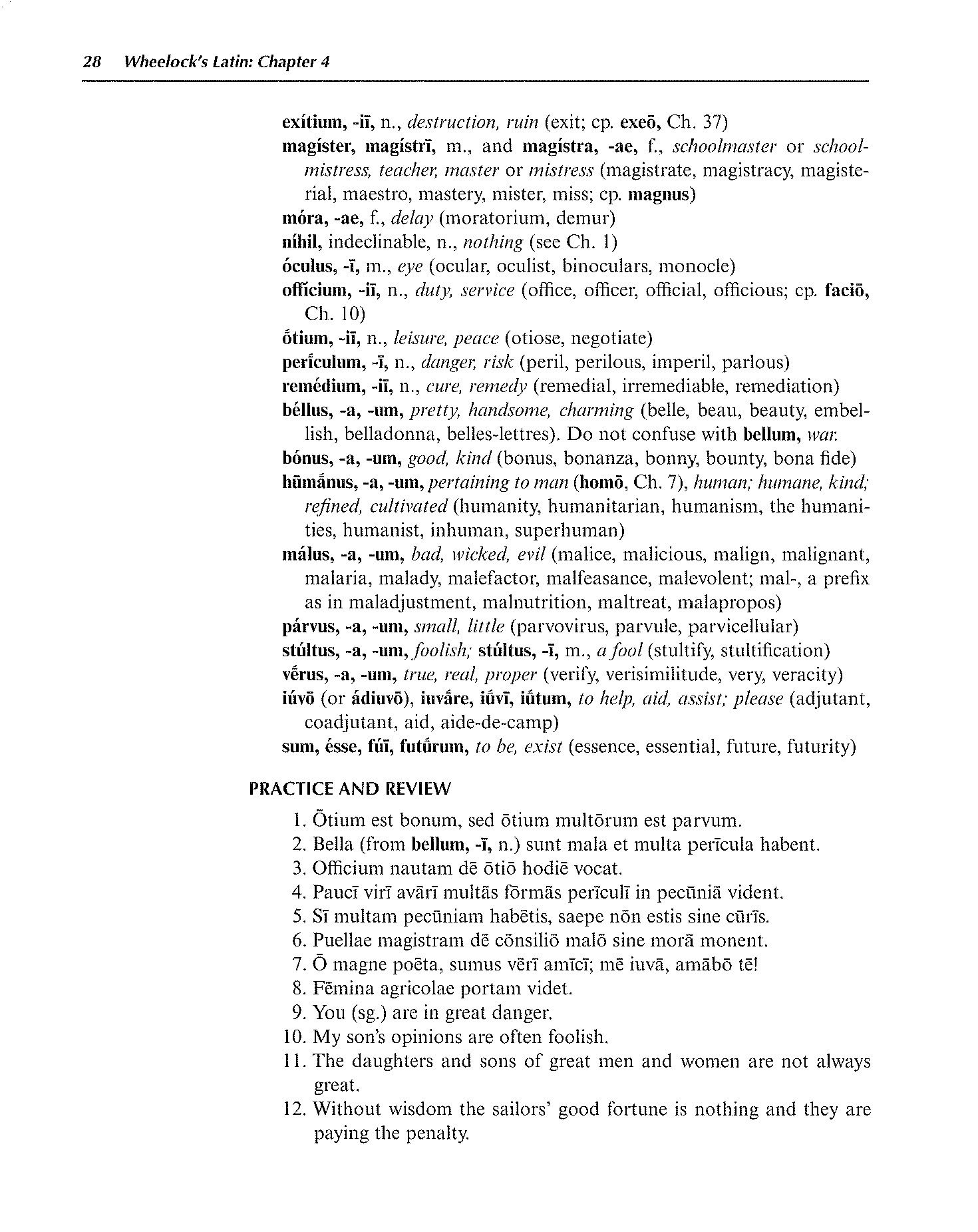
page_listing.tpl
page_subListingDetails.tpl
sub_listingDetails_style1.tpl
sub_listingDetails.title.tpl
ōtium leisure
ōtium is a Latin Noun that primarily means leisure.
Definitions for ōtium
Wheelock's Latin
Noun
- 1
leisure, peace
English derivatives:
otiose negotiate
Oxford Latin Dictionary
Noun
- 1
Unoccupied or spare time (as needed for doing something), 'the time', 'the leisure'. (b) at leisure, in peace, undisturbed.
- 2
Freedom from business or work, leisure, leisure-time, esp. as devoted to cultural pursuits; (spec.) the leisure afforded by retirement from office or by discharge from the army. (b) rest or relaxation from work, a holiday. (c) (pl. meton.) the place where on rests or relaxes; the productions of one's leisure.
- 3
Relaxation from pain, toil, etc., ease rest.
Sentences with ōtium
Latin to English
Multa bella ōtium nōn cōnservant.Compare Many wars do not preserve peace.
Et ōtium perīcula saepe habet.Compare And leisure often has dangers.
Ōtium bellō saepe nōn cōnservāmus.Compare Often we do not preserve the peace by war.
Vir parvī otiī es.Compare You (sg.) are a man of little leisure
Ōtium in patriā vestrā nōn potest esse perpetuum.Compare The peace in your (pl.) country cannot be perpetual.
Nōn bellō dēlēbiminī, sed amōre ōtiī et cōnsiliīs hominum malōrum.Compare You (pl.) will be destroyed not by war but by love of leisure and by the plans of evil men.
Numquam satis ōtiī habēbit; at aliquid ōtiī melius est quam nihil.Compare Never will he have enough leisure; yet some leisure is better than nothing.
Tu, si ego diligo, fruor iste otium, tuque persuadeo hic ita sum.Compare Do you, if you love me, enjoy that ease of yours, and persuade yourself that these things are so.
Declension table for ōtium
Cactus2000
| Singular | Plural | |
| Nom. | ōtium | ōtia |
| Gen. | ōtiī | ōtiōrum |
| Dat. | ōtiō | ōtiīs |
| Acc. | ōtium | ōtia |
| Abl. | ōtiō | ōtiīs |
Data sources
Notes
- Definitions
- Frederick M. Wheelock, Wheelock's Latin, 6th ed., rev. Richard A. LaFleur (New York, NY: HarperCollins Publishers, 2005): 28.
- P. G. W. Glare, Oxford Latin Dictionary, Vols. 1-8 (Oxford: Clarendon Press, 1982): 1277.
- Word frequencies
- Christopher Francese, "Latin Core Vocabulary," Dickinson College Commentaries, last modified 2014, http://dcc.dickinson.edu.
- Paul B. Diederich, The Frequency of Latin Words and Their Endings, PhD diss., (Columbia University, 1939).
- Louis Delatte, Suzanne Govaerts, Joseph Denooz, and Etienne Evrard, Dictionnaire fréquentiel et index inverse de la langue latine [Frequency Dictionary and Inverse Index of the Latin Language] (Liège, Belgium: Laboratoire d'analyse statistique des langues anciennes de l'Université de Liège [L.A.S.L.A.], 1981): 123.
Bibliography
Allen, Joseph H. Allen and Greenough's New Latin Grammar for Schools and Colleges: Founded on Comparative Grammar. Edited by James B. Greenough, George L. Kittredge, Albert A. Howard, and Benjamin L. D'Ooge. Boston, MA: Ginn & Company, 1903.
Crystal, David. A Dictionary of Linguistics and Phonetics. 6th ed. Oxford, UK: Blackwell Publishing, 2008.
Delatte, Louis, Suzanne Govaerts, Joseph Denooz, and Etienne Evrard. Dictionnaire fréquentiel et index inverse de la langue latine [Frequency Dictionary and Inverse Index of the Latin Language]. Liège, Belgium: Laboratoire d'analyse statistique des langues anciennes de l'Université de Liège (L.A.S.L.A.), 1981.
Diederich, Paul B. The Frequency of Latin Words and Their Endings. PhD diss., Columbia University, 1939.
Francese, Christopher. "Latin Core Vocabulary." Dickinson College Commentaries. Last modified 2014. http://dcc.dickinson.edu/latin-vocabulary-list.
Gildersleeve, Basil L., and Gonzales Lodge. Gildersleeve's Latin Grammar: Third Edition, Revised, and Enlarged. 3rd ed. London, England: Macmillan and Co., 1903.
Glare, Peter G.W. Oxford Latin Dictionary. Vols. 1-8. Oxford, England: Clarendon Press, 1982.
Krüger, Bernd. "Latin Conjugation Tables." Cactus2000. Accessed May 5, 2023. https://latin.cactus2000.de/index.en.php.
Pierson, Nick. "Sound of Text." Accessed October 26, 2019. https://soundoftext.com.
Wheelock, Frederick M. Wheelock's Latin. 6th ed. Revised by Richard A. LaFleur. New York, NY: HarperCollins Publishers, 2005.
Wiktionary Contributors. "Victionarium." Wikimedia Foundation, Inc. Updated March 18, 2019. https://la.wiktionary.org/wiki/Victionarium:Pagina_prima.
Citation
Chicago (17th ed.)
Allo Contributors. "ōtium, ōtiī (n.) - Latin Word Definition." Allo Latin Dictionary. Last modified . Accessed February 20, 2026. http://ancientlanguages.org/latin/dictionary/otium-otii.
Entry created on . Last updated on .








